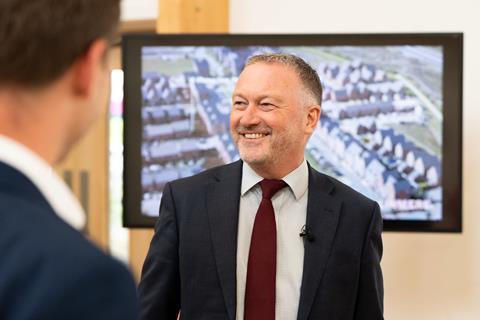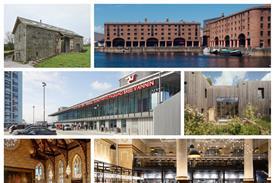Steve Reed’s commitment comes as the government’s taskforce reveals its 12 recommendations for new town locations

The new housing secretary has announced that the construction of three new towns will begin during this parliament, after a government-commissioned taskforce announced its findings.
The new towns taskforce, which is chaired by Sir Michael Lyons and Dame Kate Barker, was set up last year to identify 12 sites best suited for new town development.
After considering more than a hundred submissions, the its recommendations have been published today and welcomed by Steve Reed, who took over the Ministry for Housing, Communities and Local Government from Angela Rayner earlier this month.
The proposed schemes include large-scale standalone new communities, urban extensions and urban regeneration schemes, each of which will have at least 10,000 homes and some “considerably more”.
Of the 12 sites picked by the taskforce, Reed said the most promising locations to begin during this parliament were Tempsford, Crews Hill and Leeds Southbank.
The New Towns Taskforce’s 12 recommended sites
- A standalone settlement in Adlington, Cheshire East; to serve the growing industries in Greater Manchester and Cheshire, as identified in the government’s Industrial Strategy.
- A corridor of connected development in South Gloucestershire, across Brabazon and the West Innovation Arc; building in one of the highest productivity areas in the country with a high value research, advanced engineering and technology economy.
- An expanded development bringing together Chase Park and Crews Hill in Enfield; delivering green development and helping address London’s acute housing need.
- Redevelopment of the former airbase at Heyford Park in Cherwell; connecting to Oxford and building on the existing progress and commitment to high-quality placemaking; referencing the area’s past and supporting its future in innovative technology industries.
- Urban development in Leeds; catalysing on the city’s existing economic prospects and capturing the benefits of the governments £2.1 billion local transport funding allocation for the Combined Authority by delivering well-connected, high-quality homes in the South Bank to support the city centre.
- Inner-city development and densification in Manchester, Victoria North; supporting continued growth and attracting high-skilled workers to service the city’s diverse industries.
- A standalone settlement in the Marlcombe, East Devon; strengthening the region’s labour supply and supporting the Exeter and East Devon Enterprise Zone.
- A Renewed Town in Milton Keynes; reinvigorating the city centre and expanding to the city periphery whilst reshaping the way people travel, by delivering a Mass Rapid Transit system.
- Densified development in Plymouth; evolving Britain’s Ocean City and capitalising on the government’s £4.4 billion investment in HMNB Devonport, Western Europe’s largest naval base.
- A new settlement in Tempsford, Bedfordshire; to maximise the benefits of East West Rail, building a sustainable, well-connected new town in the heart of the Oxford-Cambridge Growth Corridor.
- The creation of a riverside settlement in Thamesmead, Greenwich; unlocking inaccessible land in the city and improving connectivity if the proposed extension of the Docklands Light Railway can be delivered to enable the development.
- Expanded development at Worcestershire Parkway, Wychavon; accelerating delivery around the existing train station to help meet regional housing need and act as a model for sustainable, carbon neutral development.
Reed pledged to “do whatever it takes to get Britain building”, establishing a ‘New Towns Unit’ to support public and private investment into the schemes, as well as fast-tracking development and working with architects to plan each town with its own distinct character.
Repeating his Trump-esque “build baby build” slogan, Reed said that hard-working people had been “locked out of a secure home for too long” and said he would “do whatever it takes to get Britain building”.
Since taking up his current role, Reed has promised an “acceleration package” to boost housing delivery, although the detailed of this package have yet to be revealed.
“This party built new towns after the war to meet our promise of homes fit for heroes. Now, with the worst economic inheritance since that war, we will once again build cutting-edge communities to provide homes fit for families of all shapes and sizes,” he said.
“I am launching the next generation of new towns taking the lessons from the post war Labour government housing boom… mobilising the full power of the state to build a new generation of new towns and restore the dream of home ownership to thousands of families across the country.”
The taskforce recommended a minimum of 40% affordable housing in the planned new towns, with half of this for affordable rent, and suggested that they should be delivered through development corporations with special planning powers to compulsory purchase land, invest in local GPs and schools, and grant planning permission.
The government welcomed these recommendations. It will now conduct a strategic environmental assessment of each of the 12 sites, as well as “any reasonable alternaties”.
The final new town locations and funding will be confirmed in Spring next year after these assessments and consultation
Industry reaction
Paul Rickard, chief executive, Pocket Living
“This report is welcome at a time when we need to significantly increase the level of new homes. The New Towns strategy provides both a medium and longer term housing strategy, something that is to be welcome.
”More importantly, this is an opportunity to place SMEs at the heart of a national housing strategy by allocating plots within the new towns to local SME developers. This could help reverse the impending extinction of the SME sector and vastly increase the delivery capability of the nation.”
Andrew Carter, chief executive of Centre for Cities
“We welcome the Government’s renewed focus on tackling the housing crisis at scale. Delivering more homes and reforming the planning system are essential for unlocking the UK’s economic potential.
“For new towns to succeed, they must be built in easy reach of jobs, most of which can be found within cities. The Taskforce’s recommended locations reflect this principle, with many of the proposals either close to or within England’s big cities.
“The proposed urban regeneration sites in today’s announcement are particularly encouraging. The UK’s big cities are low density compared to their European peers, which worsens their housing affordability and damages national economic performance.
“Turning the government’s new towns ambition into reality will require reformed planning powers, strong local leadership and delivery bodies with money and authority.”
Matthew Evans, partner, Forsters
“All the noise will be around the locations, but how they will be delivered is the crucial question.
“The major question is who is going to fund and deliver the infrastructure to underpin these large housing numbers? The power and the water, already under significant pressure, particularly in the south east, will need securing. The road and rail infrastructure will be crucial.
“A mayoral authority or development corporation is likely to be required in order to have the strategic oversight to deliver this infrastructure. CPO powers will also be required to assemble land and unlock difficult elements of sites. Are those powers going to be robust enough to deliver these homes at speed?
“The Planning & Infrastructure Bill proposes some tweaks to the procedures but do they go far enough? This lends more credence to talk of Rachel Reeves considering a second planning bill with more aggressive measures to unlock the system.
“Few people will be thinking solely in terms of homes. Of course new towns will need schools, healthcare and community facilities too. As important now are the urban logistics centres we rely on for next-day deliveries and specialised housing for older residents. These uses need to be planned for properly to create truly sustainable development, which is the “golden thread” of the system.
“The Government must be feeling the pressure over its much-repeated target to build 1.5 million new homes by 2029. No-one thinks these new towns will come out of the ground fast enough to make a significant contribution to that target, but making this work is vital to a sense of legacy and longer term achievement.”
Jonathan Seager, policy delivery director, BusinessLDN
“It’s positive to see the Government earmarking two sites in London for the development of new towns, following our recommendations to the taskforce last year. London’s acute housing need, political frameworks and infrastructure potential make it the ideal place for getting shovels in the ground quickly on new 10,000 home settlements.
“Delivering a thriving new town in Thamesmead depends on extending the Docklands Light Railway to the area – the private sector stands ready to work with the public sector to make the project happen, learning lessons from innovative financing models that have had success in other parts of the city.
“The bodies established to deliver new towns must be given the powers and funding needed to make projects a success.”
















No comments yet